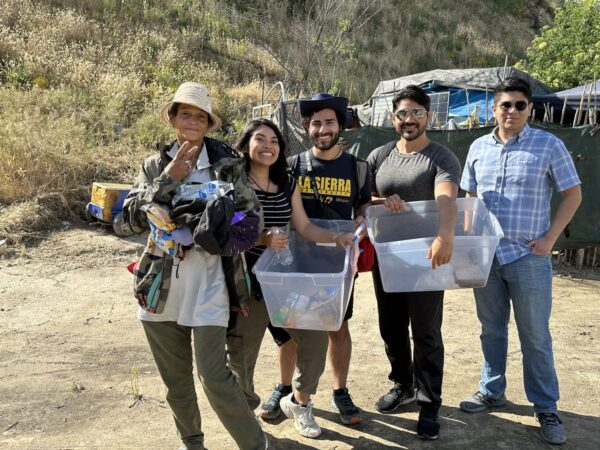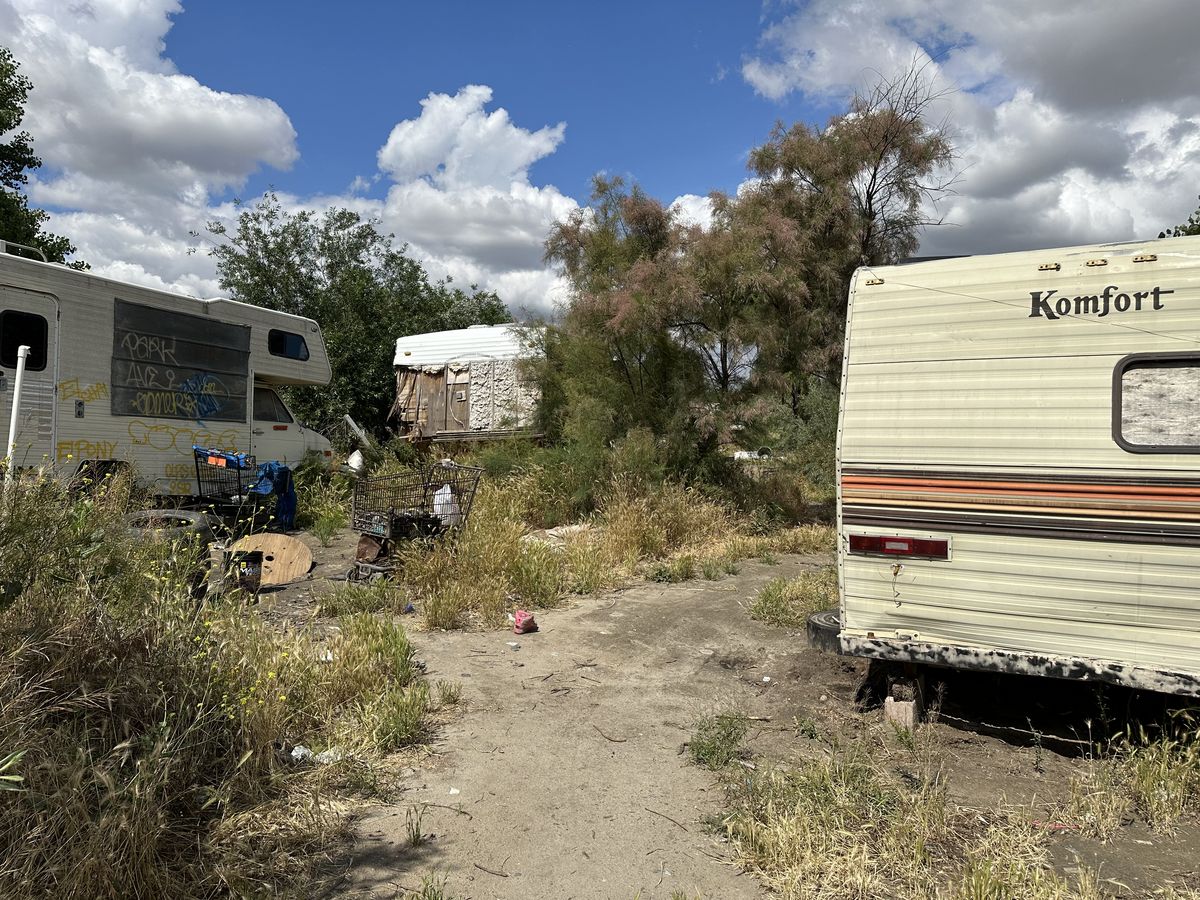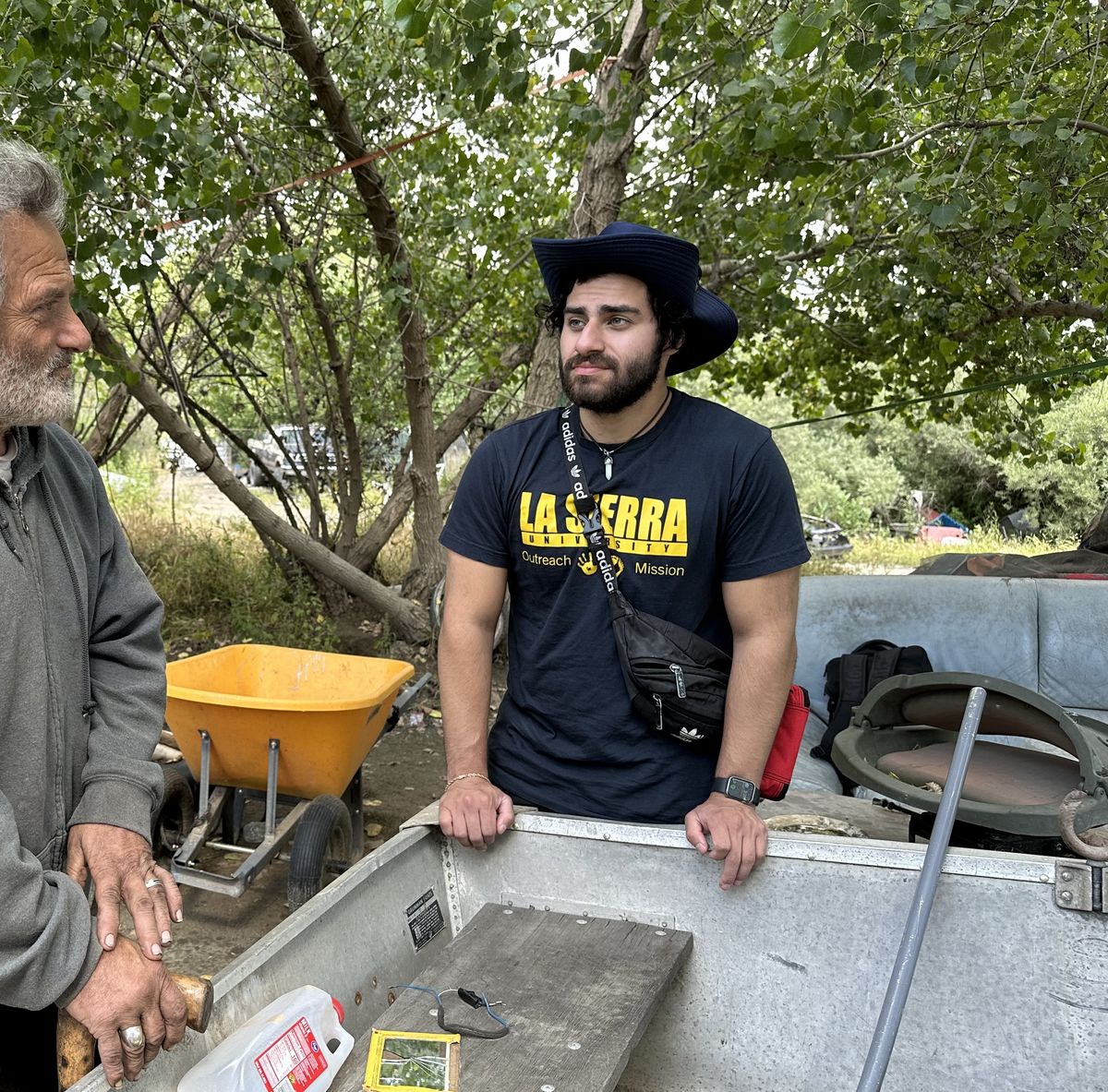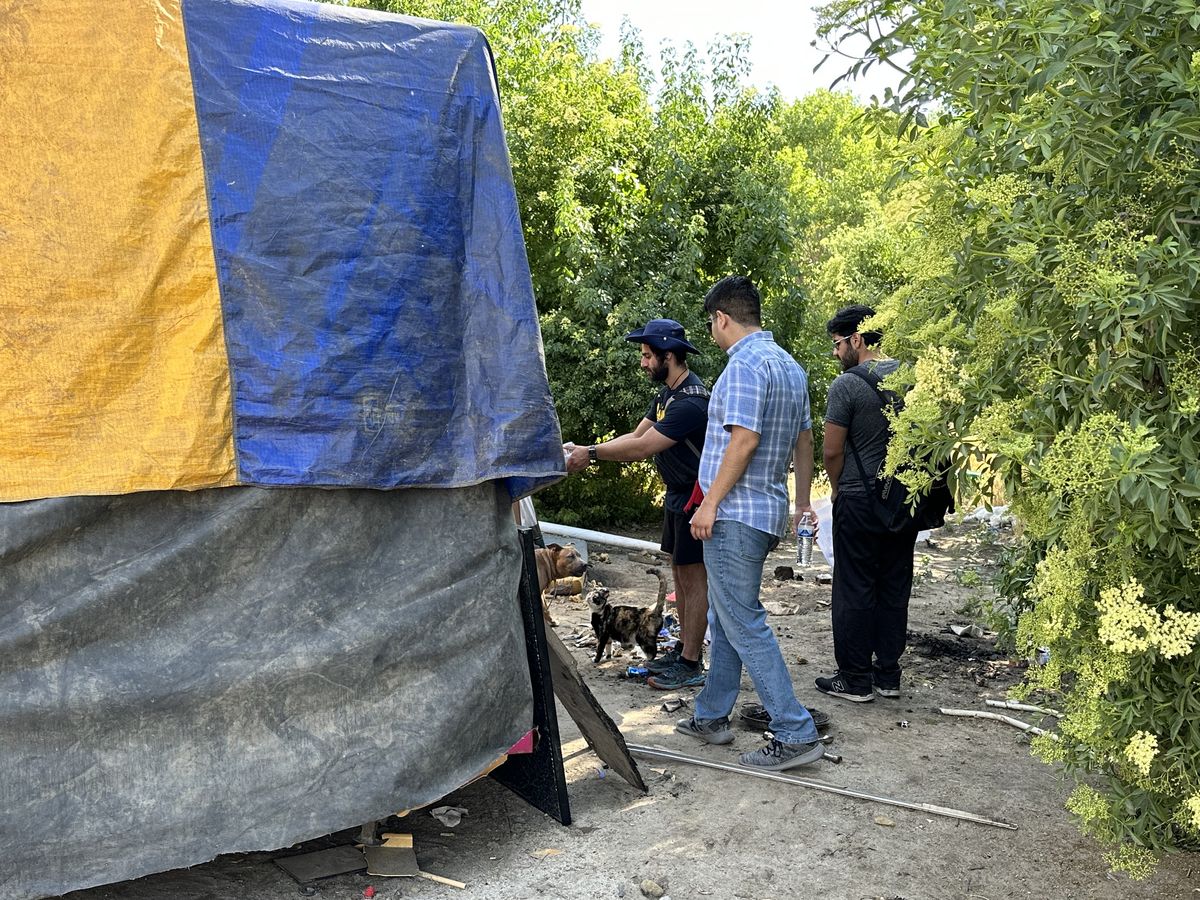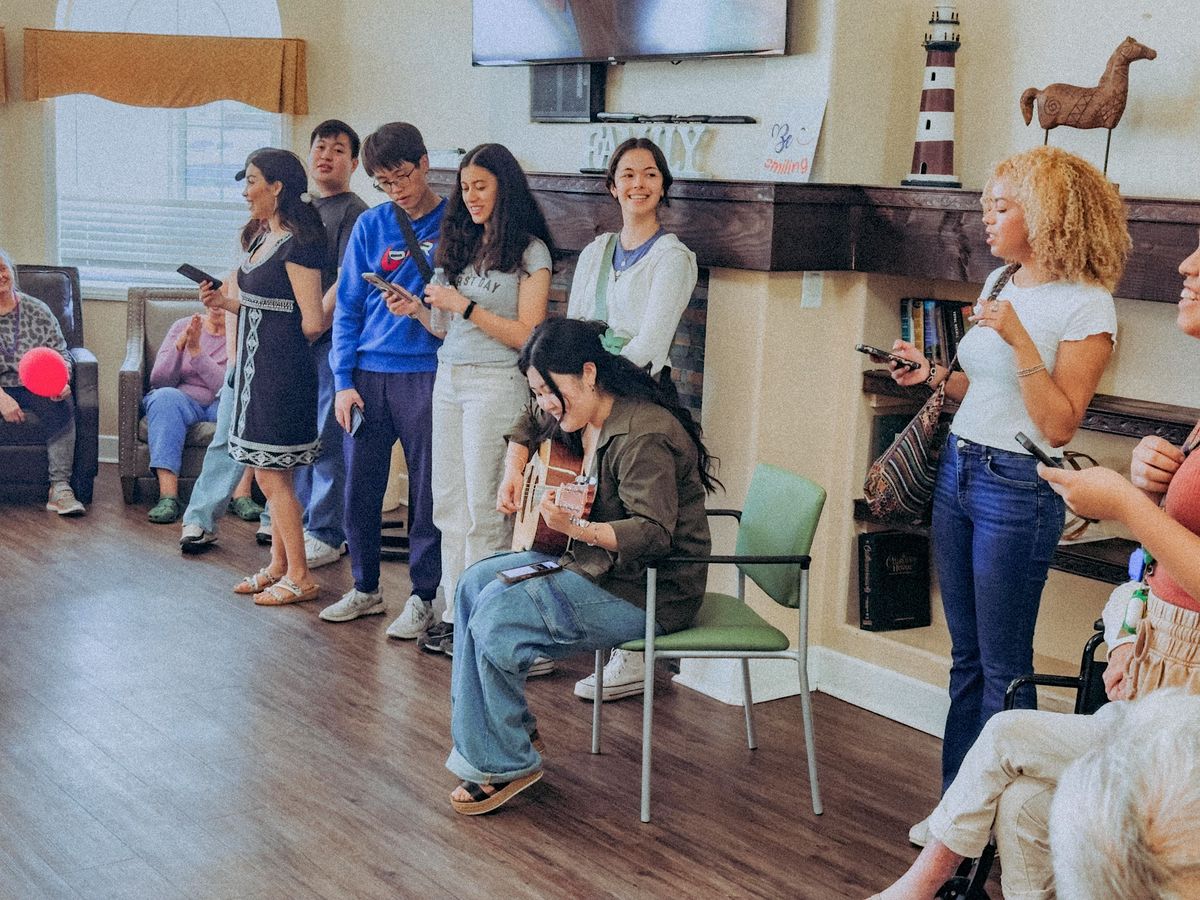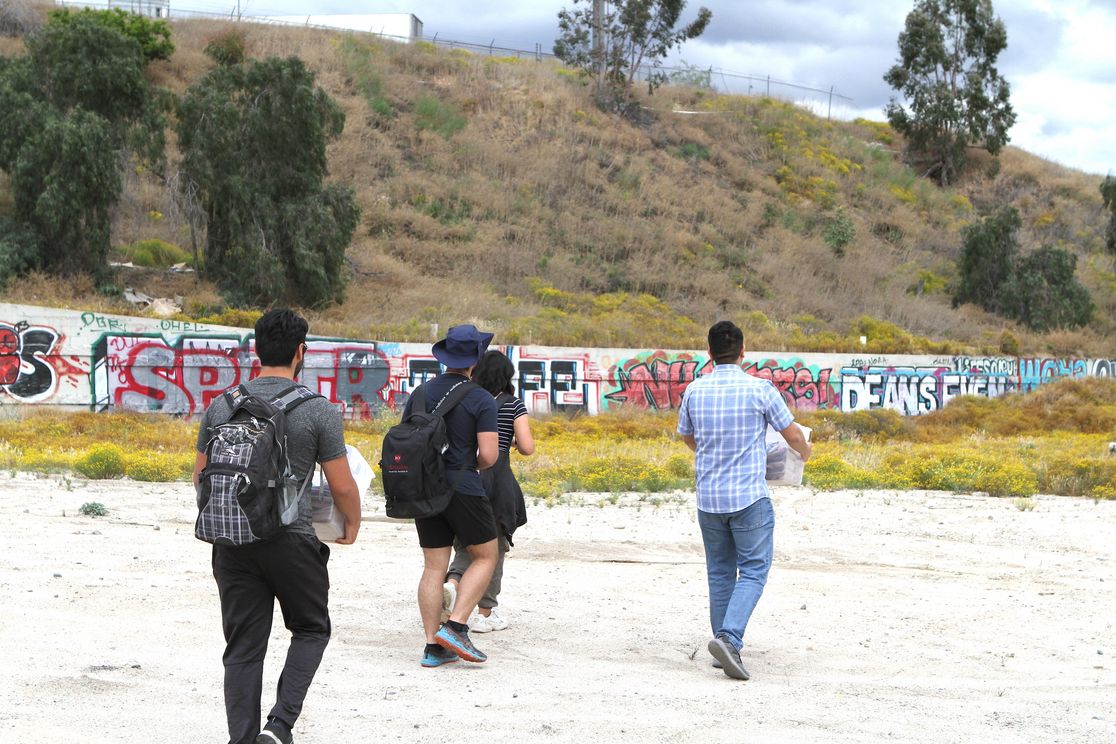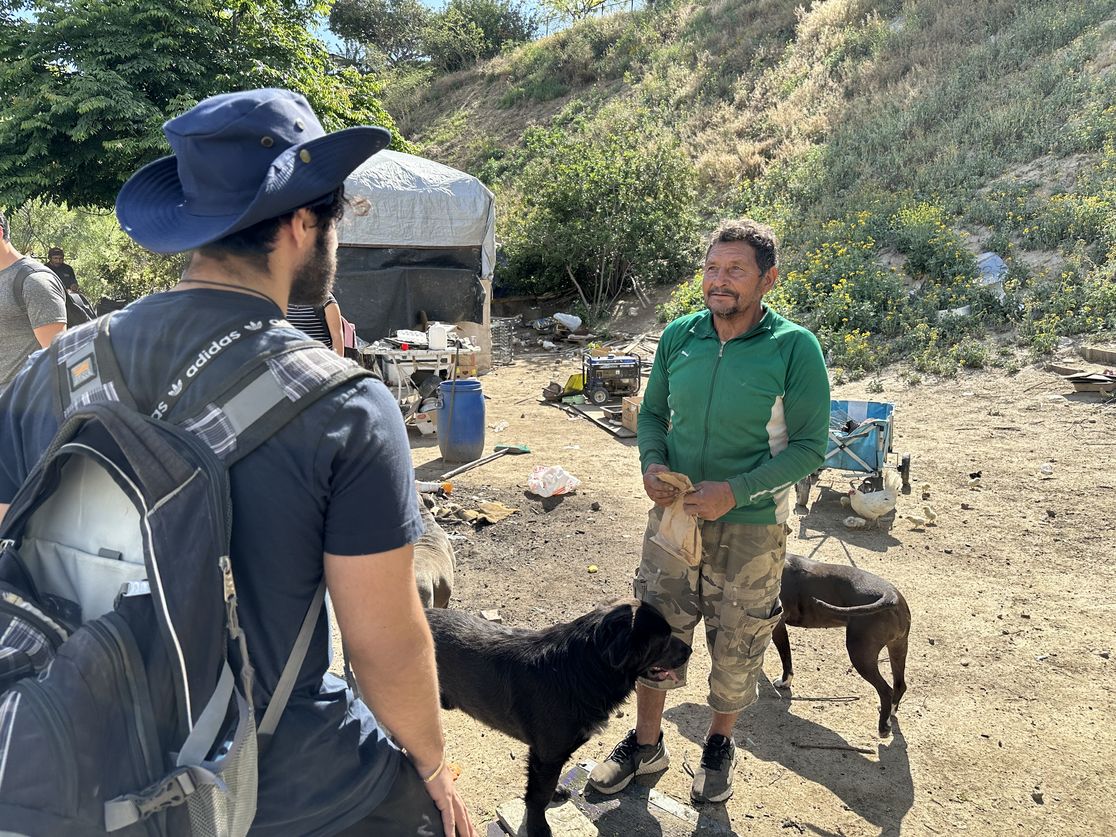Past a hillside retaining wall covered in bright graffiti, a dirt path winds through arid grasses and flowering shrubbery framed by rolling hills, the scenery of a pleasant nature walk. Down a rocky embankment into a growth of trees lining a wide, sandy river bottom the shapes of structures emerge from the shadows, the air grows heavy, and the path becomes a gateway into another world.
Last spring, four La Sierra University students, two carrying large plastic bins filled with brown bag lunches and chips and others lugging backpacks filled with water bottles, approached a lean-to structure on the side of the embankment. The small shelter, like others situated farther downhill among the dense vegetation, was surrounded by detritus and cast-off items. It was one of the last visits of the school year for students involved in The Wash Project, an outreach for the area’s unhoused living in tents, dilapidated recreational vehicles and cars, and shelters forged from tarpaulins, pieces of wood, and other repurposed materials.
The structures and shelters are scattered among the riparian woodland and grasses of the river bottom situated roughly 15 miles (24 kilometers) from La Sierra’s campus in Riverside, California, United States. Many of the residents own dogs, for both companionship and protection. A few have planted small gardens and raise chickens, including one individual who dug a make-shift water well using rudimentary equipment.
The Wash Project, a program of La Sierra’s Spiritual Life Office, got underway in fall 2022 spearheaded by pre-medical neuroscience major and Peruvian native Silvana Albornoz, along with theology major Erick Baez Rodriguez, pre-dentistry and clinical health science alumna Ashley Peak, and pre-dentistry biochemistry major Christian Figueroa. The project ultimately attracted more than 70 students over the course of a year, who participated in weekly group visits to the encampment. The students aimed to provide life-affirming connection and conversations while offering food, bottled water, and other necessities, and spiritual support through prayer for residents who desired it.
More than 300 students and faculty members donated food for The Wash Project using extra money from meal plans at the end of the year.
The Wash Project’s last outing to visit the unhoused took place in spring 2023, and during the summer students planned to create new ways to serve and help their community. This school year, project leaders are forming a new outreach endeavor called ReACT based on their work with the homeless encampment.
Over the past two years, the students began to actualize the vision of ReACT through The Wash Project, Albornoz said. “They have gained an immense amount of experience with trial and error. ReACT is a response to their dreams and vision for communal and local outreach.”
Albornoz and other Wash Project leaders pattern their approach to outreach after Jesus’ methods of helping others. “The first thing He will do is always supply their needs,” Albornoz said, “and then He will say, ‘Follow me.’ ”
Albornoz and other Wash Project founders and students are now leading ReACT with the help of John Thomas, dean of the Zapara School of Business. Each Friday, students visit residents of The Gardens of Riverside, an assisted living facility under a project they call “Adopt a Grandparent.” The students aim to engage with the residents through a variety of activities, offering companionship, joy, and intergenerational exchange, Albornoz said. The students’ first meeting with the residents took place during the third week of school. “It was a success,” Albornoz said. “They met so many residents and loved their energy. They want to invite more students from La Sierra to experience a wonderful day with the elderly in our community.”
Between winter 2022 and throughout spring 2023, students made weekly treks to visit unhoused residents of the river wash who typically land there for a variety of complex, often interrelated reasons — health-care challenges and shattering personal losses, mental health problems, prior incarcerations, drug addictions, and resulting obstacles retaining employment, lack of identification records, and challenges entering and remaining in social service programs. Many struggle with issues rooted in difficult childhoods filled with abuse and neglect.
Inspired to Serve
Albornoz, on the other hand, grew up influenced by her physician father, his frequent visits to his childhood home in an impoverished rural village, and his promise to never forget his roots. Albornoz was a first-year medical student at the Seventh-day Adventist Church’s Peruvian Union University (UPU) when her father organized a free health campaign in his community. She helped with logistics for the project and created programs for children. She and her family were also members of the Villa Union Adventist church at the university, where Albornoz participated in outreach activities and where she developed a love for helping others. “That is thanks to my parents,” she said. “They put that in me, and I really liked it.”
Engaging in service opportunities through La Sierra’s Office of Spiritual Life proved to be a natural draw for Albornoz. She found support through campus chaplain Jason Decena and associate chaplain Pono Lopez, who provided resources and encouraged the formation of The Wash Project. Her initial idea was to tackle a major societal challenge such as homelessness and provide opportunities for volunteers with different talents to serve and impact others using their gifts, such as music or art or athletics.
“I wanted to make a huge program with different little programs and different leaders where you can go and help out,” she said. Her friend and fellow student Baez Rodriguez provided the encouragement and support she needed to get started, she said.
Conversations and planning began in fall 2021 and by winter 2022 Albornoz and fellow students had established the homeless outreach endeavor with the help of additional students and advice from San Bernardino Fusion Ministry, a homeless program in Loma Linda.
Albornoz, together with Baez Rodriguez, Figueroa, and then-Spiritual Life Outreach director and student chaplain Ashley Peak, set about locating homeless individuals in the Riverside area whom they could approach to offer assistance. They started their quest in Riverside’s Fairmount Park, at the time known to be frequented by unhoused individuals.
Eventually they encountered one individual who directed them to the wash area of the nearby river, but the students encountered only three people.
“So, we took notes and hung out with them for a little bit,” Albornoz said. “We tried to show them we weren’t there to hurt them. They have problems, and they don’t trust easily. We came back the next week and brought sandwiches and what they needed.”
Three or four weeks passed, and the students returned each week to serve the small group of unhoused individuals they had encountered. During one visit, a girl approached them and asked for their assistance with another group of homeless people. She led the students down to the river wash. “We followed her, and we found this huge camp. We decided to work with that area, and that’s how it started,” Albornoz said.
Albornoz and the team began marketing The Wash Project to the campus in emails and social media posts. The project attracted a following of students who joined the weekly caravan bringing food, water, and spiritual sustenance to the wash encampment each Friday afternoon.
“I think the secret of outreach is consistency,” Albornoz said. “The key is to build relationships with them. You can’t make change if you don’t follow up, so that [is] our purpose.”
The original version of this story was posted by La Sierra University.


